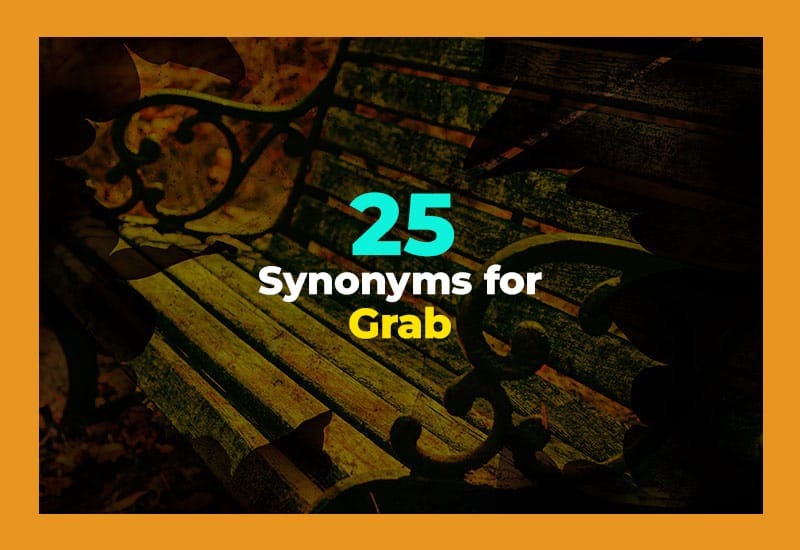You ever need to grab something fast—like your keys, a snack, or someone's attention? We all do it, but why always say “grab”? There are so many fun and easy words you can use instead. Words like snatch, clutch, and scoop make your sentences pop! Whether you’re writing, texting, or just talking, switching up your words can make things sound more interesting.
1. Seize
To seize something means to take it quickly and firmly. It's often used when grabbing something with purpose or urgency. You might seize an opportunity, a bag, or even someone's hand. “She had to seize the last slice of pizza before anyone else could!” This word is great for showing strong action. It sounds a bit more powerful than just "grab." People often use it in both fun and serious situations. When you seize something, you don't wait around—you act fast and take hold of it before it's gone. It's a great word when you want to show quick action.
2. Snatch
Snatch means to grab something quickly, often in a sneaky or fast way. It can be used when someone takes something before others can react. “The boy snatched the toy from the table before his sister could reach it.” Snatching is all about speed and surprise. It can sound playful or rude, depending on the situation. People snatch up deals during sales, or snacks off the plate when no one's looking. This word adds a quick, sharp feeling to your sentence. If you want to show that someone acted fast without thinking too much, snatch is a great word to use.
3. Catch
Catch means to stop something from moving away or to take hold of it while it's moving. It can be fun, like catching a ball, or serious, like catching someone's mistake. “He managed to catch the falling book before it hit the ground.” This word is very common and easy to understand. You can catch someone's attention, a cold, or even a ride. It's not just about using your hands—it can mean noticing or reacting quickly. Catch is a great word when you want to show that something was taken or held in motion, with timing and care.
4. Grip
Grip means to hold something tightly. When you grip something, you don't let go easily. It's often used when you need a strong hold on something. “She gripped the handle tightly as the car turned sharply.” It's a useful word when talking about safety, fear, or control. You can grip someone's hand, a rope, or even the edge of your seat. Grip gives your sentence a sense of strength and tension. It shows that whatever is being grabbed is important or needs to be held firmly. This word adds a feeling of power to your writing or speech.
5. Grasp
Grasp means to take hold of something firmly with your hands or to understand an idea clearly. “He grasped her hand just in time to stop her from falling.” Grasp shows a clear and thoughtful kind of grabbing. It's not wild or fast—it's careful and meaningful. You can grasp a tool, a rope, or even a thought. People use it in both real and mental situations. This word makes things feel more important. It's useful in stories, talks, or even learning moments. Grasp is a strong but calm way to say "grab" when you want to show full attention or care.
6. Take
Take is one of the simplest words for "grab." It means to move something into your control or hold. “He took the book from the shelf and started reading.” This word can be used in almost any situation. You can take a snack, a break, or even a chance. It's not always fast or sneaky—just the action of grabbing or holding. Since it's so easy, it fits well in everyday talk. Take is perfect when you don't need anything fancy, but just want a clear way to say someone grabbed something. It works with things, people, or even ideas.
7. Pick
Pick means to choose and take something, often with care. You pick fruit, flowers, or items off a shelf. “She picked an apple from the tree and took a big bite.” It's a softer and more thoughtful version of "grab." When you pick something, you're not rushing—you're making a choice. This word is used in shopping, gardening, and games. Kids pick toys, people pick clothes, and workers pick tools. Pick is a friendly and gentle word that still shows someone taking hold of something. It's useful when you want to show careful grabbing without being rough or fast.
8. Clutch
Clutch means to hold something tightly, often because of fear or strong feeling. It's more emotional than just grabbing something. “She clutched her teddy bear during the scary movie.” When you clutch something, you really don't want to let go. It's usually with both hands and full focus. You can clutch a bag, a hand, or even a heart (in a poetic way). This word brings emotion into your sentence and makes the action feel more dramatic. If someone is scared, happy, or shocked, they might clutch something. It's a great word for moments filled with strong feelings.
9. Yank
Yank means to pull something with a sudden, strong motion. It's a fast and rough way of grabbing. “He yanked the door open and rushed inside.” This word adds a loud, forceful feeling to your sentence. You can yank a rope, a drawer, or even someone's arm. It's often used when someone is in a hurry or feeling frustrated. Yank is not soft or slow—it's all about power and quick movement. It's great for stories where you want to show action and urgency. It also works well when you need to show a surprising or angry grab.
10. Hold
Hold means to keep something in your hands or arms without letting go. It's a calm and steady kind of grabbing. “He held her hand all the way home.” You can hold objects, hands, or even thoughts. It's a loving, caring word that makes people feel safe. Hold doesn't mean snatching or pulling—it means keeping close. This word is often used in warm, friendly, or peaceful ways. Whether you’re holding a baby or a cup of coffee, it shows comfort. Hold is a simple and sweet way to talk about grabbing that feels calm and full of care.
11. Nab
Nab means to grab something quickly, often before someone else can. It's fun, casual, and often used in surprise situations. “He nabbed the last cookie when no one was looking.” This word adds playfulness to your sentence. It's like catching something in a game or sneaking a snack. Police may nab a thief, and kids might nab toys from each other. Nab is great when you want to show fast action that's not too serious. It's perfect for fun stories or jokes. If someone acts quickly and gets what they want, "nab" is a great way to say it.
12. Fetch
Fetch means to go and grab something, then bring it back. It's a soft and polite word. “Can you fetch my jacket from the car, please?” People often use this when asking for help. Dogs are also taught to fetch balls or toys. Fetch shows effort and care—it's not rushed or rough. You can fetch water, papers, or even help. It's perfect for polite talk or gentle stories. This word works well in homes, schools, and formal talks. If someone goes, gets something, and returns with it, "fetch" is the right word to use.
13. Hook
Hook means to grab or catch something with a curved shape or motion. “He hooked his bag on the chair and sat down.” You can hook things with your finger, a tool, or even an actual hook. This word adds a visual image to your sentence. It feels light but smart—like catching something in a clever way. People also hook arms while walking, or hook clothes on a rack. It's a gentle grab, not too fast or strong. Hook works great when you want to show smart or soft grabbing that involves catching, holding, or pulling with style.
14. Scoop
Scoop means to lift or pick up something in a rounded, curved motion. “She scooped ice cream into the bowl with a big smile.” You can scoop things with your hands, a spoon, or even your arms. It's usually soft and smooth. Scoop works great for food, sand, snow, or even a pet. This word is very friendly and fun. It makes the action sound light and playful. You can even scoop someone up for a hug. Scoop is a warm and kind way to grab something, making your words feel cozy, simple, and full of charm.
15. Cling
Cling means to hold on tightly and not let go. It shows a strong emotional or physical connection. “The child clung to her mother on the first day of school.” It's more than just a grab—it's about staying close. You can cling to someone out of love or fear. Clothes can cling to the body. This word adds emotion and strength to your sentence. It makes things feel more serious or heartfelt. Cling is perfect when you want to show someone holding on in a deep or lasting way, either with hands or with feelings.
16. Tug
Tug means to pull something quickly or with effort. It's a small, strong movement. “The girl tugged her dad's hand to show him something.” You can tug on clothes, bags, or even a rope in a game. It's often used in fun or stubborn moments. Tug shows that someone wants attention or wants something moved. It's different from a big yank—it's smaller and more playful. This word works well with kids, games, or when something is stuck. Tug makes your writing sound active and playful, with just the right amount of effort and fun.
17. Pull
Pull means to move something toward you using force or effort. It's a simple and common action. “He pulled the door open and walked outside.” You can pull a drawer, a cart, or even a person's sleeve. It can be soft or strong, depending on how you use it. Pull is useful in all kinds of daily talk. It's easy to say and fits almost anywhere. You can pull someone into a hug or pull out a chair. This word is helpful when you want to show movement and effort in grabbing or moving something.
18. Swipe
Swipe means to move your hand across something quickly to take or use it. “He swiped the last piece of cake before anyone saw.” It's fast and a little sneaky. People swipe cards to pay or swipe screens to move pictures. You can also swipe things in fun or teasing ways. It's a word that feels modern and playful. If someone acts quickly, without asking, "swipe" fits well. It's great for funny or casual situations. Swipe is all about fast grabbing with a twist—perfect for stories, jokes, or when things move quickly from one place to another.
19. Pluck
Pluck means to grab or pull something off gently but firmly. It's often used with flowers, fruit, or even courage. “She plucked a rose from the garden and smiled.” This word adds a careful and charming touch. It's not rushed or rough—it's more thoughtful. Musicians pluck guitar strings. You can also pluck up courage to do something hard. Pluck is great for showing small, focused action. It makes the grabbing feel smart and special. It's useful in writing, speaking, or any moment where you want to show light and careful grabbing with purpose.
20. Lift
Lift means to raise something by grabbing and moving it upward. It's useful for both small and heavy things. “He lifted the box and carried it upstairs.” You can lift babies, bags, or spirits. Lift is a positive, strong word. It shows effort and care. When you lift something, you help it move higher. People also use it to talk about making others feel better. It's a nice, simple word for many kinds of grabbing. Whether you're helping or moving, lift shows you're doing something useful with care.
21. Catch hold of
Catch hold of means to grab something quickly before it moves or falls. “She caught hold of the railing to stop herself from slipping.” It's longer than "grab," but shows quick thinking. This phrase is used when someone acts fast in a tricky moment. You might catch hold of a falling paper or someone's hand. It feels real and clear. It's perfect for writing where you want to show action, reaction, or safety. Catch hold of is a useful phrase when something is at risk and someone takes control right away.
22. Get
Get means to take or receive something. It's one of the most basic and flexible words. “Can you get the keys for me?” People use it all the time in speaking and writing. You can get food, gifts, or even chances. It doesn't always mean "grab," but it often fits that role. Get is a light, easy word. It works in every kind of talk—from texting to business. It's perfect when you want something simple and direct. You don't need fancy words when "get" does the job. It's easy and always ready to use.
23. Wrench
Wrench means to grab and pull something with a sudden, twisting motion. “He wrenched the door open after it got stuck.” It's a rough and strong word. You use wrench when things don't move easily. It shows struggle or force. People wrench tools, bags, or even away from trouble. Wrench gives your writing energy and tension. It's perfect for serious or dramatic scenes. This word helps when you want to show that grabbing something wasn't easy—but it got done. Wrench is for those strong, bold moves in tough moments.
24. Capture
Capture means to take something and keep it, often with effort or skill. “The team captured the flag during the game.” You can capture people's hearts, photos, or even animals. It's more than just grabbing—it's about holding on. Capture feels complete and planned. It works well in writing, storytelling, and even games. When you capture something, it usually means you won't let it go. This word adds purpose and strength. Whether it's a real object or a special feeling, "capture" helps show that something important was taken and held onto.
25. Haul
Haul means to grab and pull or carry something heavy. “He hauled the bag of tools up the hill.” It's often used when moving things with effort. You can haul boxes, nets, or even trash. It shows work and power. This word makes your sentence feel real and strong. It's great when someone is doing hard work. Haul is also used in fishing or big moves. It tells people that grabbing something took time and effort. When someone hauls something, they don't just grab it—they carry it with strength and care.

Final Thoughts
Finding different ways to say "grab" can make your writing more fun and clear. Each word above adds something special—some show speed, others show strength, and some even show emotion. Using the right word helps people understand exactly what you mean. Whether you're telling a story, writing a message, or learning new words, these synonyms give you more tools to work with. Try using a new one today and see how it changes your sentence!









